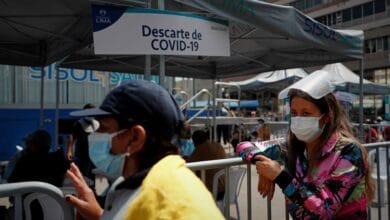Former UN experts demand immediate intervention in Myanmar Covid crisis

Bangkok Desk, Jul 22 (EFE).- A group made up of former United Nations representatives to Myanmar demanded Thursday the “immediate humanitarian intervention” of a UN-mandated mission to combat the Covid-19 crisis in the Asian country.
“The situation has become a humanitarian disaster of such proportions that an international presence of health and medical personnel has become critical,” said Special Advisory Council for Myanmar NGO member Chris Sidoti, formerly part of the UN’s Independent International Fact-Finding Mission on Myanmar.
Sidoti added that the military junta that took power “deliberately fueled” the health crisis and “has neither the will nor the capacity to tackle a crisis on this scale.”
The country, plunged into a deep political crisis as a result of the Feb. 1 coup, is facing its worst wave of infections and deaths of the pandemic, alongside a collapse of the health system, a lack of oxygen supply and deep distrust of the military.
Health authorities reported 6,093 new cases of Covid-19 and 247 deaths on Wednesday, bringing the total to 246,663 infected and 5,814 deaths.
With a testing capacity limited to between 12,000 and 15,000 a day among a population of 55 million, and crematoriums overflowing with bodies, Myanmar medical associations maintain that the official figures do not reflect reality.
The NGO called for a UN Security Council intervention under a joint initiative with the Association of Southeast Asian Nations (ASEAN) that includes health workers on the ground to ensure that the assistance serves to save the lives of millions of people affected by the new wave of the pandemic.
In 2008, after Myanmar was struck by the devastating Typhoon Nargis, which according to estimates left more than 100,000 dead in the country, a similar humanitarian intervention was carried out when the nation, also ruled by the military at the time, remained isolated from the international community.
The Special Advisory Council for Myanmar proposed corridors on the borders together with civil associations, ethnic authorities and with the shadow National Unity Government, made up of dozens of former elected parliamentarians and activists.
“The junta is not a partner for the delivery of aid. That is why a humanitarian presence on the ground is needed,” said the NGO’s Yanghee Lee, who was the UN’s special rapporteur on the situation of human rights in Myanmar between 2014 and 2020.
The authorities, who have violently suppressed peaceful opposition, have detained and issued arrest warrants for hundreds of health workers who refuse to work for the military dictatorship.
However, doctors and nurses have created an underground network of assistance to avoid the military.
“Assistance must be delivered through international medical personnel, and international protection given to Myanmar’s own medical professionals who are desperate to come out of hiding and work to save their country. No one will trust anything from the junta now,” Lee added. EFE
nc/tw





